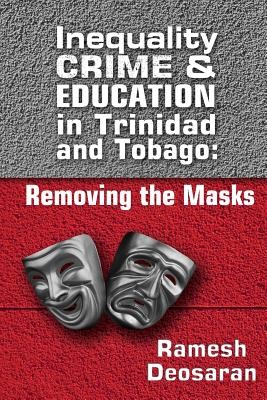
- We will send in 10–14 business days.
- Author: Ramesh Deosaran
- Publisher: Ian Randle Publishers
- Year: 2016
- ISBN-10: 9766379203
- ISBN-13: 9789766379209
- Format: 15.2 x 22.9 x 2.2 cm, softcover
- Language: English
- SAVE -10% with code: EXTRA
Inequality Crime & Education in Trinidad and Tobago (e-book) (used book) | bookbook.eu
Reviews
Description
The issues surrounding the academic under-performance of the government secondary schools in Trinidad and Tobago, compared with the denominational assisted schools have been debated for many years. An equally persistent issue surrounds the placement in the secondary schools and the inequalities which many persons perceive to be inherent in the process.
In this masterly study, Professor Ramesh Deosaran examines the nature and dimensions of inequality in opportunities for education, and their relationship to gender, race, family background and socio-economic status. He effectively demonstrates that unequal opportunity and unequal outcomes are embedded in the country's education system - a legacy from the colonial past that institutionalized a system of schools run by the government and those run by religious denominations but supported by the state. Deosaran points to the 1960 Concordat which enshrined the rights of these denominational assisted schools and argues the case for revisiting the status quo to debate whether to revise, scrap or enshrine the Concordat in the constitution.
Deosaran argues that the structural inequity in the education system and its outcomes amount to discrimination against the most disadvantaged groups with serious debilitating implications for the country's social and economic progress and its status as a modern democracy. He calls for a removal of the masks of inequality and discrimination and appeals for sustained, carefully planned and data-driven reforms in Trinidad and Tobago's education system.
The study is multi-disciplinary in nature drawing from various disciplines, including politics of education, the sociology of education, the economics of education and educational psychology, backed up by data from his own research and from a variety of reports dating back to the 1960s.
EXTRA 10 % discount with code: EXTRA
The promotion ends in 20d.20:20:42
The discount code is valid when purchasing from 10 €. Discounts do not stack.
- Author: Ramesh Deosaran
- Publisher: Ian Randle Publishers
- Year: 2016
- ISBN-10: 9766379203
- ISBN-13: 9789766379209
- Format: 15.2 x 22.9 x 2.2 cm, softcover
- Language: English English
The issues surrounding the academic under-performance of the government secondary schools in Trinidad and Tobago, compared with the denominational assisted schools have been debated for many years. An equally persistent issue surrounds the placement in the secondary schools and the inequalities which many persons perceive to be inherent in the process.
In this masterly study, Professor Ramesh Deosaran examines the nature and dimensions of inequality in opportunities for education, and their relationship to gender, race, family background and socio-economic status. He effectively demonstrates that unequal opportunity and unequal outcomes are embedded in the country's education system - a legacy from the colonial past that institutionalized a system of schools run by the government and those run by religious denominations but supported by the state. Deosaran points to the 1960 Concordat which enshrined the rights of these denominational assisted schools and argues the case for revisiting the status quo to debate whether to revise, scrap or enshrine the Concordat in the constitution.
Deosaran argues that the structural inequity in the education system and its outcomes amount to discrimination against the most disadvantaged groups with serious debilitating implications for the country's social and economic progress and its status as a modern democracy. He calls for a removal of the masks of inequality and discrimination and appeals for sustained, carefully planned and data-driven reforms in Trinidad and Tobago's education system.
The study is multi-disciplinary in nature drawing from various disciplines, including politics of education, the sociology of education, the economics of education and educational psychology, backed up by data from his own research and from a variety of reports dating back to the 1960s.


Reviews